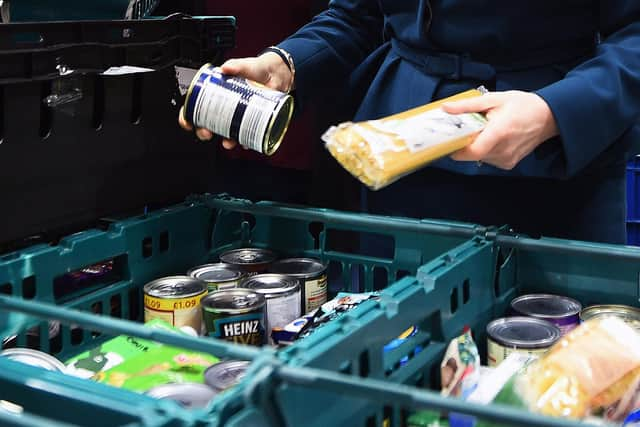Cost-of-living crisis: Food banks at breaking point with 320,000 first-time users
The cost-of-living crisis is driving food banks to "breaking point" with almost 1.3 million emergency parcels given to people in hunger over just six months, a leading charity has said.
The Trussell Trust issued a stark warning on Thursday after new research showed record-breaking levels of need, with one in five individuals referred to its network now coming from working households.
Advertisement
Hide AdAdvertisement
Hide AdAccording to figures from the charity, which provides urgent support to those in poverty, more emergency food parcels were given out during the April to September period than ever before.


Over the last six months, 320,000 people have been forced to turn to food banks for the first time, it added.
Nearly 1.3 million food parcels were handed out by food banks in the Trussell Trust's UK network over the same period - almost half a million of which went to children.
This is double the number provided in the same timeframe before the pandemic and a third more than were given out between April and September last year.
Need is now exceeding donations for the first time in the charity's history.
The trust has warned food banks are now at "breaking point" due to a "tsunami of need" driven by the cost-of-living crisis as it called on the Government to provide adequate support in its upcoming budget.
Josie Barlow, food bank manager at Bradford Foodbank said: "Someone who came to the food bank recently told me that 'buying milk is a luxury now'. So many people are struggling with bills and food prices.
"We are fortunate to be able to help people and we work hard to support them in both the short and long term, but we are also facing challenges.
Advertisement
Hide AdAdvertisement
Hide Ad"We have seen a huge increase in people coming to the food bank in the last two months compared with the same period last year and our stock levels are very low for this time of the year."
Emma Revie, chief executive at the Trussell Trust, said: "These new statistics show that, even in summer months, people are struggling to afford the essentials and we are expecting that this winter will be the hardest yet for food banks and the people they support. This is not right."
She added: "We are calling for the Prime Minister to act decisively in next week's budget. We urge the UK government to realise their commitment of supporting people on the lowest income with a broad package of support.
"As well as ensuring that benefits rise with inflation as soon as possible, this must go further to close the gap between price rises and incomes over the winter."
A Government spokesman said: "We are directly supporting households in need following the aftershocks from the pandemic and Putin's illegal war in Ukraine, including sending another Cost-of-Living Payment this month worth £324 to over eight million people, part of a £1,200 package for those on the lowest incomes.
"Our extensive immediate support for families also includes our energy price guarantee, saving around £700 for a typical household over winter, and our household support fund, worth over £1 billion to help people with essential costs, combined with longer-term changes such as altering Universal Credit to help people keep £1,000 more of what they earn every year."
Comments
Want to join the conversation? Please or to comment on this article.